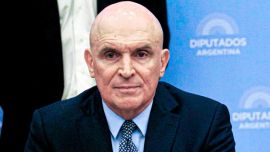Mired in recession, with sky-high poverty, inflation and unemployment, Argentina’s GDP is expected to fall by 3.1 percent in 2019.
Fernández blames market-friendly predecessor Mauricio Macri and his austerity measures for the country’s economic woes.
INFLATION
The Cambiemos leader failed to control inflation during his time in office. The International Monetary Fund (IMF) predicts price increases will hit 57 percent by the end of the year – a figure outstripped across the world only by Venezuela and Zimbabwe.
The economic crisis was sparked by a sudden crash in the pesos’s value 18 months ago. It lost more than 50 percent in 2018 and is down another 38 percent this year. Rampant inflation and the currency’s falling value has hit spending power drastically.
RECESSION
Argentina has been in recession since the second quarter of 2018. Last year, the economy shrank by 2.5 percent. The IMF expects the economy to shrink by another 3.1 percent this year and 1.3 percent in 2020. It has already contracted for the last 17 months in a row.
Fernández is hoping to stimulate the economy by encouraging buying and refunding taxes to small and medium-sized businesses – an important sector in the bid to prevent unemployment, which has hit almost 10 percent, from continuing to increase.
POVERTY
Rising poverty, which currently affects 41 percent of Argentina’s 44 million people, is one of the biggest concerns. Earlier this year, Congress adopted a food emergency law to allocate greater resources to social programmes. Fernández has launched a plan alongside businesses and social organisations to “tackle hunger” by distributing food stamps.
DEFICIT
Macri’s austerity measures enabled Argentina to reduce its primary fiscal deficit from almost seven percent of GDP in 2015 to an estimated 0.9 percent this year. In return, the International Monetary Fund agreed to a bail-out loan of US$57 billion, some US$44 billion of which has been disbursed. However, Fernández has said he will refuse the remainder.
DEBT
Debt has risen to US$335 billion, including the IMF loan. The IMF expects Argentina’s debt as a percentage of GDP to reach 93 percent by the end of the year, compared with 53 percent when Macri came to power.
Fernández says Argentina is in “virtual default” and blames Macri’s government for leaving his administration in a position where it cannot pay its debt. The government has stressed that it wants to pay down the debt debt but insists that “to be able to pay, we have to be able to, and for that, there needs to be growth.”






















Comments